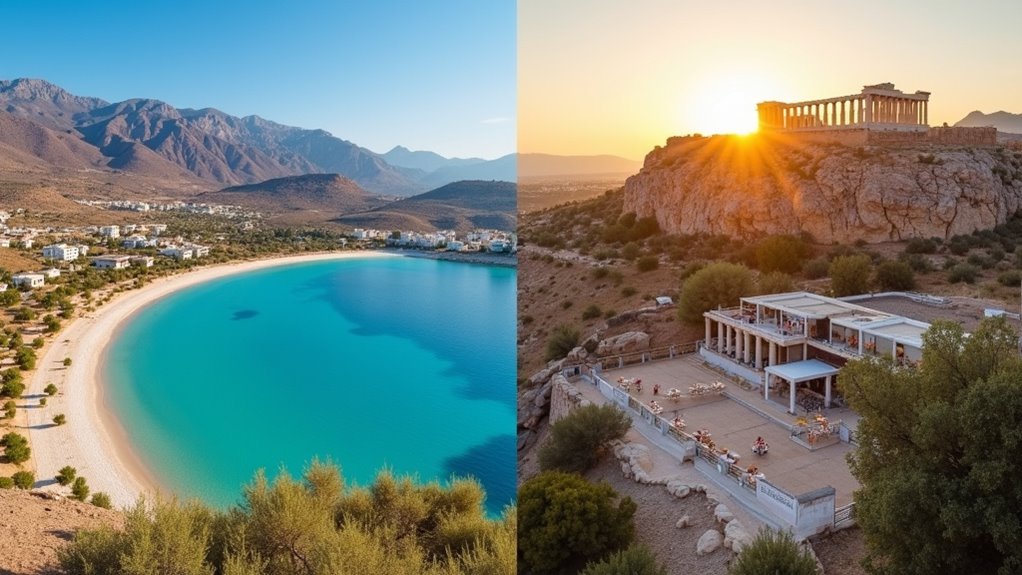Physical Address
304 North Cardinal St.
Dorchester Center, MA 02124
Physical Address
304 North Cardinal St.
Dorchester Center, MA 02124

Struggling to choose between Crete's beaches and Athens' ancient wonders? Discover which Greek destination truly matches your travel style.
When you’re planning a Greek getaway, the choice between Crete and Athens often proves challenging. Each destination offers a completely different experience of Greek culture and heritage. You’ll find stunning beaches and ancient Minoan ruins in Crete, while Athens showcases iconic classical landmarks and vibrant urban life. Your perfect vacation depends entirely on what you’re seeking—relaxed island atmosphere or historical urban exploration? The answer isn’t straightforward, but understanding the distinct character of each place will help you make the right decision.

When deciding between Crete and Athens for historical exploration, you’ll face a delightful dilemma of ancient wonders.
Athens showcases Classical Greek civilization with the iconic Acropolis complex, featuring the Parthenon, Erechtheion, and Propylaea. The ancient and Roman Agoras offer glimpses into daily Greek life, with the well-preserved Hephaisteion and Tower of the Winds. Any history enthusiast should also visit the Temple of Olympian Zeus, an impressive ancient structure that took nearly 700 years to complete.
The Acropolis rises above Athens, a testament to Classical Greek brilliance where ancient agoras whisper stories of bygone daily life.
Crete counters with Minoan civilization treasures—Knossos Palace (the largest Bronze Age site) with its reconstructed sections and vibrant frescoes, Phaistos with its famous disk, and the well-preserved town of Gournia. Visitors to Knossos should be prepared for crowds and queues, but the historical significance makes it worth enduring the wait.
The island also features the Roman capital Gortyna with its ancient law code and unique sites like Spinalonga fortress and the historically significant Arkadi Monastery.
If you’re dreaming of shoreline bliss and natural beauty, the contrast between Crete and Athens couldn’t be more striking. Crete dominates with world-class beaches like pink-sanded Balos, while Athens lacks notable coastal attractions.
Crete’s diverse 160-mile coastline offers everything from secluded coves to dramatic cliffs and lagoons. The island’s accessibility makes it perfect for island hopping adventures if you want to explore more of Greece’s maritime treasures. You’ll find natural wonders at every turn – from the UNESCO-protected Samaria Gorge to the majestic White Mountains and rare wildlife like the Kri-Kri goat.
For outdoor enthusiasts, Crete provides extensive hiking trails and varied terrains perfect for multi-day adventures. The island’s natural environment makes it ideal for scuba diving enthusiasts, offering underwater exploration opportunities at higher costs than Athens’ urban activities.
Athens, primarily an urban destination, offers little beyond Lycabettus Hill walks and requires day trips elsewhere for comparable natural experiences.
Within hours in Crete, you can experience mountains, plains, and pristine beaches – a natural diversity Athens simply can’t match.

Both Cretan and Athenian cuisines offer distinctive gastronomic experiences that tell stories of their unique cultures and histories.
In Crete, you’ll discover one of the healthiest Mediterranean diets featuring barley-based Dakos, abundant olive oil, and fresh local produce. Western Crete’s traditional taverns nestled among olive groves provide authentic dining experiences with dishes that have influenced broader Greek cuisine. Crete is particularly famous for its galaktoboureko dessert, a custard-filled, syrup-soaked treat that exemplifies the island’s rich pastry tradition.
Athens presents Greece’s iconic classics like souvlaki, moussaka, and authentic Horiatiki salad. The capital boasts diverse dining options from traditional tavernas to innovative restaurants, plus a vibrant street food scene featuring gyros and other quick bites. If you want to explore beyond these destinations, many Greek islands are easily accessible from Santorini for additional culinary adventures.
Both destinations embrace seasonal ingredients and olive oil as foundational elements, though each region maintains distinct specialties.
Wherever you dine, you’ll experience food’s central role in Greek social and cultural life.
Finding the right place to stay can make or break your Greek vacation experience, with Athens and Crete offering distinctly different accommodation landscapes to suit various preferences and budgets.
In Athens, you’ll find everything from luxury hotels near the Acropolis (€100-300/night) to affordable hostels (€15-30/night). The city boasts excellent public services, world-class museums, and extensive tourist information centers. Booking accommodations several months ahead is essential due to seasonal demand, especially during peak travel periods. However, parking can be challenging in narrow streets.
Crete provides a more diverse geographical spread with beachfront villas, traditional family-run guesthouses, and resort towns like Chania and Heraklion. The island excels in beach amenities and outdoor activity infrastructure, with tourist centers strategically located near attractions. For couples seeking a memorable getaway, Crete offers numerous romantic settings that have made it one of Greece’s premier honeymoon destinations.
Both destinations see price increases during peak season (June-September), so booking ahead is advisable.

Transportation can make or break your Greek adventure, with Athens and Crete offering distinctly different options for getting around.
Your transportation choices dictate your Greek experience—Athens and Crete each demand their own navigation strategy.
In Athens, you’ll find an extensive public transit network with metro lines connecting Piraeus port and the airport—making a rental car unnecessary. Those looking to experience Athens’ vibrant nightlife can easily access the city’s popular party spots using public transportation or short taxi rides.
Crete, however, demands a different approach. While KTEL buses connect major coastal towns like Heraklion and Chania, you’ll want a rental car (€30-50/day) to explore remote beaches and mountain villages. For travelers planning to visit other islands after Crete, direct flights are limited, with most routes requiring a connection through Athens.
The island’s limited public transportation makes self-driving essential for flexibility.
Both destinations connect via ferry (8h40m, €45) or flights (under 3h, €35-140).
Athens serves as the main transportation hub, while Crete offers good coastal roads but challenging mountain routes.
Taxis are available in both locations but scarce in rural Crete.
When it comes to culture, Athens and Crete present dramatically different yet equally enriching experiences that showcase Greece’s multifaceted heritage.
In Athens, you’ll find iconic landmarks like the Acropolis and Temple of Olympian Zeus alongside world-class institutions such as the National Archaeological Museum. The city buzzes with events like the Athens Festival and magical August Full Moon celebrations at historical sites. The vibrant neighborhoods of Plaka and Monastiraki offer visitors a perfect blend of historical significance and contemporary Greek life.
Crete offers a different cultural flavor with the Palace of Knossos and Heraklion Archaeological Museum highlighting its Minoan past. The island’s Renaissance Festival of Rethymnon and Cultural Summer events provide authentic glimpses into local traditions. Families traveling with children will appreciate Crete’s family-friendly festivals that combine entertainment with cultural education throughout the summer months.
Cretan cuisine distinguishes itself with its emphasis on local olive oil and unique dishes like gamopilafo, best experienced at traditional tavernas throughout the island.

Beyond the cultural treasures awaiting travelers, timing your visit to Athens or Crete can considerably impact your overall experience.
For both destinations, late April to early June offers the sweet spot—warm temperatures between 17-23°C, ideal for sightseeing and hiking without summer’s intense heat.
You’ll find significant advantages during shoulder seasons (spring and autumn): prices drop up to 20% in Crete, tourist numbers thin out, and you’ll enjoy more authentic experiences. Athens is particularly worth visiting in spring when the ancient ruins are surrounded by blooming wildflowers and the city comes alive with outdoor cafés.
While summer brings perfect swimming conditions with warmer seas, July and August also bring crowds and temperatures that sometimes exceed 32°C. Winter months from November to March see fewer than one million visitors monthly throughout Greece, though many island accommodations close during this period.
High season offers pristine swimming, but prepare for tourist throngs and scorching Mediterranean heat.
If you’re budget-conscious, consider September to early October when you’ll still enjoy warm weather and can swim, but with fewer travelers and lower accommodation prices—plus you’ll better support local economies during their off-peak periods.
Whether you’re drawn to Crete’s ancient Minoan wonders and pristine beaches or Athens’ iconic Acropolis and buzzing neighborhoods, you can’t go wrong either way. At the end of the day, your perfect Greek getaway boils down to what moves your spirit—tranquil island living or urban historical immersion. Both destinations offer unforgettable experiences that’ll have you planning your return before your tan even fades.